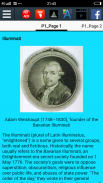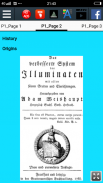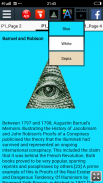








Illuminati History

توضیحات Illuminati History
The Illuminati (plural of Latin illuminatus, "enlightened") is a name given to several groups, both real and fictitious. Historically, the name usually refers to the Bavarian Illuminati, an Enlightenment-era secret society founded on 1 May 1776. The society's goals were to oppose superstition, obscurantism, religious influence over public life, and abuses of state power. "The order of the day," they wrote in their general statutes, "is to put an end to the machinations of the purveyors of injustice, to control them without dominating them".[1] The Illuminati—along with Freemasonry and other secret societies—were outlawed through edict, by the Bavarian ruler, Charles Theodore, with the encouragement of the Roman Catholic Church, in 1784, 1785, 1787 and 1790.[2] In the several years following, the group was vilified by conservative and religious critics who claimed that they continued underground and were responsible for the French Revolution.
Many influential intellectuals and progressive politicians counted themselves as members, including Ferdinand of Brunswick and the diplomat Xavier von Zwack, who was the Order's second-in-command.[3] It attracted literary men such as Johann Wolfgang von Goethe and Johann Gottfried Herder and the reigning dukes of Gotha and Weimar.[4]
روشن فکران (جمع illuminatus لاتین، "روشنفکر") یک نام داده شده به چند گروه، هر دو واقعی و ساختگی است. از لحاظ تاریخی، نام معمولا به باواریا روشن فکران، یک جامعه مخفی روشنگری دوران در 1 ماه مه 1776. تاسیس اهداف این انجمن بودند به مخالفت با خرافات، تاریک اندیشی، نفوذ مذهب بر زندگی عمومی، و سوء استفاده از قدرت دولت اشاره دارد. "منظور از روز،" آنها در اساسنامه کلی خود نوشته بود که "برای پایان دادن به دسیسه از purveyors از بی عدالتی، آنها را کنترل بدون تسلط بر آنها". [1] روشن فکران-همراه با فراماسونری و سایر جوامع مخفی-شد از طریق حکم ممنوع توسط حاکم باواریا، چارلز تئودور، با تشویق از کلیسای کاتولیک روم در 1784، 1785، 1787 و 1790. [2] در چند سال بعد، این گروه توسط منتقدان محافظه کار و مذهبی که ادعا کرد که آنها در زیر زمین ادامه داد و مسئول انقلاب فرانسه بود بدگویی می شد.
بسیاری از روشنفکران با نفوذ و سیاستمداران مترقی خود را به عنوان اعضای شمارش، از جمله فردیناند از Brunswick و دیپلمات خاویر فون Zwack، که بود سفارش دوم در فرماندهی. [3] این مردان ادبی مانند یوهان ولفگانگ فون گوته و یوهان گوتفرید هردر و آمیلیا حاکم از گوتا و وایمار جلب کرده است. [4]
























